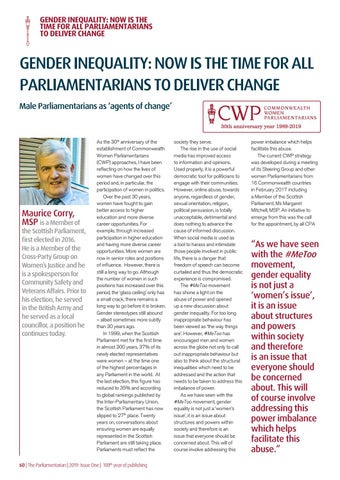GENDER INEQUALITY: NOW IS THE TIME FOR ALL PARLIAMENTARIANS TO DELIVER CHANGE
GENDER INEQUALITY: NOW IS THE TIME FOR ALL PARLIAMENTARIANS TO DELIVER CHANGE Male Parliamentarians as ‘agents of change’
Maurice Corry, MSP is a Member of
the Scottish Parliament, first elected in 2016. He is a Member of the Cross-Party Group on Women’s Justice and he is a spokesperson for Community Safety and Veterans Affairs. Prior to his election, he served in the British Army and he served as a local councillor, a position he continues today.
As the 30th anniversary of the establishment of Commonwealth Women Parliamentarians (CWP) approaches, I have been reflecting on how the lives of women have changed over this period and, in particular, the participation of women in politics. Over the past 30 years, women have fought to gain better access to higher education and more diverse career opportunities. For example, through increased participation in higher education and having more diverse career opportunities. More women are now in senior roles and positions of influence. However, there is still a long way to go. Although the number of women in such positions has increased over this period, the ‘glass ceiling’ only has a small crack, there remains a long way to go before it is broken. Gender stereotypes still abound – albeit sometimes more subtly than 30 years ago. In 1999, when the Scottish Parliament met for the first time in almost 300 years, 37% of its newly elected representatives were women – at the time one of the highest percentages in any Parliament in the world. At the last election, this figure has reduced to 35% and according to global rankings published by the Inter-Parliamentary Union, the Scottish Parliament has now slipped to 27th place. Twenty years on, conversations about ensuring women are equally represented in the Scottish Parliament are still taking place. Parliaments must reflect the
60 | The Parliamentarian | 2019: Issue One | 100th year of publishing
society they serve. The rise in the use of social media has improved access to information and opinions. Used properly, it is a powerful democratic tool for politicians to engage with their communities. However, online abuse, towards anyone, regardless of gender, sexual orientation, religion, political persuasion, is totally unacceptable, detrimental and does nothing to advance the cause of informed discussion. When social media is used as a tool to harass and intimidate those people involved in public life, there is a danger that freedom of speech can become curtailed and thus the democratic experience is compromised. The #MeToo movement has shone a light on the abuse of power and opened up a new discussion about gender inequality. For too long inappropriate behaviour has been viewed as ‘the way things are’. However, #MeToo has encouraged men and women across the globe not only to call out inappropriate behaviour but also to think about the structural inequalities which need to be addressed and the action that needs to be taken to address this imbalance of power. As we have seen with the #MeToo movement, gender equality is not just a ‘women’s issue’, it is an issue about structures and powers within society and therefore is an issue that everyone should be concerned about. This will of course involve addressing this
power imbalance which helps facilitate this abuse. The current CWP strategy was developed during a meeting of its Steering Group and other women Parliamentarians from 16 Commonwealth countries in February 2017 including a Member of the Scottish Parliament, Ms Margaret Mitchell, MSP. An initiative to emerge from this was the call for the appointment, by all CPA
“As we have seen with the #MeToo movement, gender equality is not just a ‘women’s issue’, it is an issue about structures and powers within society and therefore is an issue that everyone should be concerned about. This will of course involve addressing this power imbalance which helps facilitate this abuse.”
